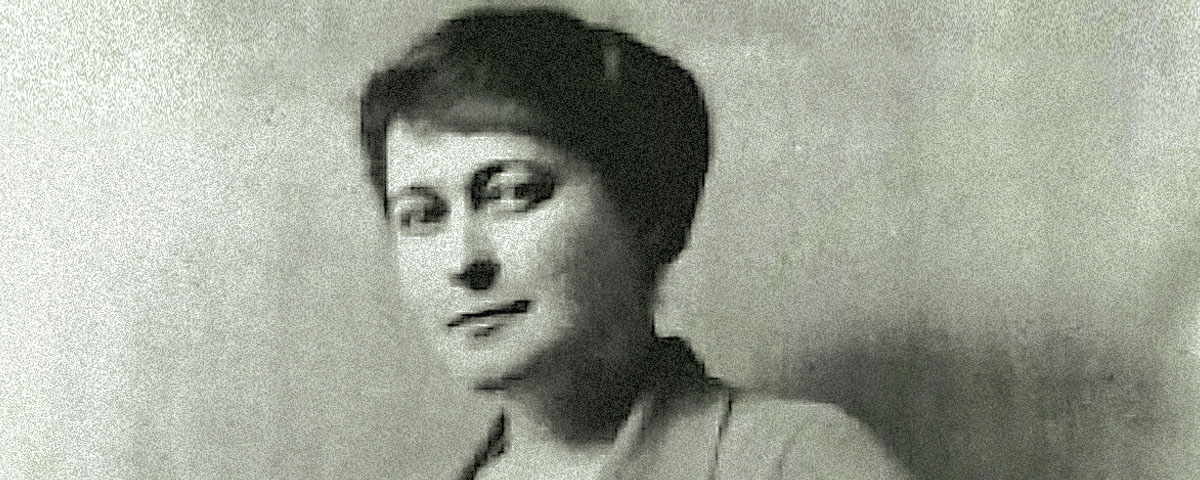Eleanor Franklin Egan, born Bertha Eleanor Pedigo in 1877, was placed in the Rose Orphan Home in Terre Haute, Indiana, following the death of her mother. She was later adopted and raised in Martinsville, Illinois, and Kansas City, Missouri. She moved to New York City in 1898 in search of an acting career but ended up in journalism instead.
Egan covered the Russo-Japanese War and the Russian Revolution for Leslie’s Weekly and World War I and its aftermath for the Saturday Evening Post. She died in New York in 1925, at age 45, from pneumonia.
In 1915 Egan made headlines all over the world when she survived a deadly submarine attack on the British passenger ship Barulos. She wrote about the experience for the Saturday Evening Post, from which this account is excerpted.
I was leaving Greece.
The war I had run from in Serbia, in Bulgaria, and in Turkey snarled at my heels in Athens. Greece was mobilizing; everything was in the utmost confusion, and I knew I must get away, my objective then being my own homeland, where there was no war.
Sailings of the Italian ships to Brindisi had not been suspended; but in that direction the greatest danger lay. There were rumors of Austrian submarines, and one was made to believe that to the westward they were as thick as fishes in an aquarium. Very well; I would go down to Egypt, and from Egypt I would go to Malta, from Malta to Palermo, and thence across to Naples. There was a promise of British and Italian convoy on this route, and the sensible idea is always to seek the safest possible avenue.
It was the Barulos or nothing, everything else afloat being engaged in service connected with either Greek mobilization and the transportation of troops to Macedonia or with the battle of Gallipolli, which was then wallowing along to its end.
The Barulos it had to be. I was the only English-speaking passenger aboard. The three-hundred-odd other passengers suggested nothing but nomadic tribes.
I was standing by the rail when the submarine came up—all by myself. I was restless, and I was tremendously interested in the surface of the sea. I always shall be after this. Never again shall I be able to sweep a bright horizon from a ship’s deck without seeing that black hulk rising like a whale coming up to “blow.”
Your mind at such a moment is like a film in a camera. It captures and fixes every minutest detail. I remember the white wash of the sea off the submarine decks, though it rose halfway between us and the sky line. I remember the instantaneous of the flash of fire and the reverberating boom which caught up just in time to mingle with the crack of an exploding shell and the loud swish of a geyser that it threw into the air. It was the explosion of that shell that settled our fate. If the submarine could have used some other kind of signal the panic would not have been so instantaneous and complete. But the concussion shook the ship; and all those buried in the bowels of the ship—firemen, engineers, sailors, steerage passengers, everybody, thought just one thing, and that thing was “Torpedoed!”
I had to clutch the rail to steady myself.
Goodness knows how long I stood there. I don’t. Moreover, I have no idea how the first impulse of the crowd expressed itself. I suppose there must have been a momentary hesitation of unbelief before a scream was uttered; but when the sobbing sounds of fear did penetrate my daze they curdled my blood—and that I know.
I turned finally and started aimlessly for the gangway that led below to the cabins. Then I got caught in the crush at the gangway, I being seriously bent on going down when everyone else was in frantic haste to come up. I remember blackened firemen and uniformed officers and sailors fighting women and children and other men in a way that chilled my heart and closed the very shutters of my mind.
It was toward the Englishmen’s lifeboats that the crowd stampeded. They were the only lifeboats instantly available, and more than 300 persons had gone insane with a determination to get into them.
There was a Greek sailor standing in the bow of the boat toward which I had been rushed by the mob, and I turned in time to see him cutting away like a madman at the rope that held it. I had just sense enough to observe instantly that nobody was doing anything at all to the ropes at the other end; and then it was, I think, that I lost my reason too. The boat was already overloaded and people were still crowding into it, and I got a swift, terrible vision of its being loosed at one end only, and of the whole struggling, screaming lot of them being plunged into the sea. I reached out and caught the sailor’s arms; but—
I think I went over just as the boat fell. How? I wish I knew. There was a clutch of hands behind me, a sudden lift, a long, sickening drop—and I was looking wide-eyed through the blue seethe of the sea. Some noble soul, of course, had tried to lift me into the lifeboat and had caught me off my balance as I struggled with the sailor. When I came up and caught my breath in the air, and began mechanically to keep my head above water, I was still thinking that I must go to my cabin and get a life belt. I had been thinking this subconsciously all the time; and that shows how quickly it all happened.
By the time I had adjusted myself and had stroked my way out into a space by myself—away from the clutching hands and the struggling others—our submarine had come up and was lying under our bows, with two 1,200-pound guns trained on our water line. It was the English captain who told me afterward that they were 12-pounders, else I should not have known. Hereafter, though, I think I shall always know a 12-pounder when I see one, because I looked straight into their muzzle from where I floated in the sea.
My eyes ran down the gleam of them, seeing photographically their every detail. Behind them stood two gunners, as straight and still as statues of men. They were awaiting the order to fire, and I had a sort of frantic feeling that I was exactly in range and was likely to be blown to bits.
The commander of our submarine was an Austrian; and if the German idea is right he should have been court-martialed and shot for being weak—and merely human. I imagine that he was once a proud, upstanding navy man, with swashbuckling thoughts, perhaps, and dreams of brave fights with fighting ships. But he was not fitted to command a submarine under orders to be ruthless. He wept!
They got me. I was picked up by one of the lifeboats. I sank into it, exhausted. Do you know anything about the blessed feel of one when it is the only thing between you and the illimitable awfulness of black sea depths?
I am going to skip all the particulars about how my lifeboat was filled with sailors and firemen mostly; how we rowed round afterward and picked up others, until the big chief steward, who was in command, decided we had all we could take care of; how three lifeboats were stampeded as they were launched and swamped as soon as they touched the water; how one woman after another threw her children into the sea, screaming to God to let them be saved by someone, somehow; and how the long swells caught little bodies and swept them far out beyond the reach of rescue.
Yet I would, if I could, make you see the pitiful ship drifting aimlessly and dejectedly there under the guns; and I would, if I could, make you see how the sunset bathed all the horrors in a marvelous light. I would, if I could, make you hear the feeble wails of the little Arab baby I picked up and tucked away under my wet coat, and feel the weight of the dead woman they dragged in and threw across my knees. I would, if I could, call up before you all the 25 drowned—14 of them children, and only three of them men—and have you listen to their stories. But these are details, only details.
Two weeks later I crossed that spot on a Dutch ship, which I boarded at Port Said for Genoa; within a month I had crossed to the English Channel and was on an American Line ship bound for New York. I can only add that, until I came within sight of the Statue of Liberty, I was subject to occasional heart contractions which felt exactly the way you do when you are dropped suddenly in an elevator.
I went back before the Germans completed their arrangements for unrestrained ruthlessness. MHQ
[hr]
This article appears in the Summer 2017 issue (Vol. 29, No. 4) of MHQ—The Quarterly Journal of Military History with the headline: Torpedoed!
Want to have the lavishly illustrated, premium-quality print edition of MHQ delivered directly to you four times a year? Subscribe now at special savings!






